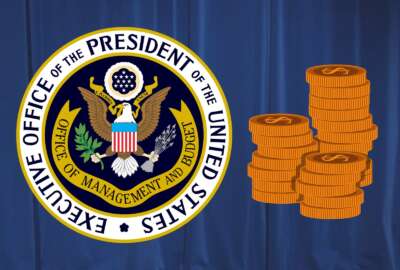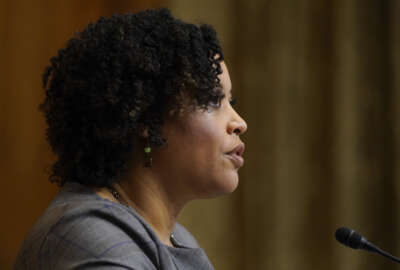Biden’s OMB controller pick faces opportunity to reinvigorate long-vacant role
The Biden administration is taking steps to fill a major role at the Office of Management and Budget left without a permanent officeholder for nearly five years.
The Biden administration is taking steps to fill a major role at the Office of Management and Budget left without a permanent officeholder for nearly five years, but will have a major role overseeing COVID-19 and infrastructure spending.
President Joe Biden announced Tuesday he expects to nominate former Department of Housing and Urban Development Chief of Staff Laurel Blatchford to serve as OMB controller.
Blatchford also served as a member of the agency review team for HUD and the Federal Housing Finance Agency for the Biden transition team.
OMB went without a permanent controller for the entirety of the Trump administration. The administration nominated Fred Nutt in September 2017 to serve as OMB controller and received a confirmation hearing a year later, but his nomination never received a floor vote in the Senate.
Dave Mader, now at Deloitte, served as the last permanent OMB controller, but left government in January 2017. Tim Soltis served as deputy controller until October 2020, when he accepted a new position as senior adviser to OMB’s Deputy Director for Management Jason Miller.
Former OMB controllers said their successor will face a unique opportunity to oversee agencies spending trillions in COVID-19 pandemic spending, as well as infrastructure spending and managing the federal government’s real estate footprint.
Mader said some of his biggest responsibilities while OMB controller included working with the Chief Financial Officer Council on cross-cutting work like meeting mandates under the Digital Accountability and Transparency (DATA) Act.
That cross-agency collaboration remains essential, Mader said in an interview Tuesday, now that Congress has authorized trillions of dollars in COVID-19 spending, and is soon expected to authorize trillions more in infrastructure spending.
Building on the lessons learned from the pandemic and the tradeoffs standing up federal aid programs quickly, Mader said the next OMB controller will have an opportunity to shape what program integrity looks like across the federal government, especially as it pertains to the Biden administration’s focus on equity in government services.
“You don’t want to put in place controls that are so onerous that individuals that are truly entitled to these payments are not getting those payments. That’s not an easy task, but I think that’s going to be critical going forward. I think it has ramifications for years to come. How do you build a program integrity protocol that balances making sure that bad actors are not getting federal benefits, but on the other hand, people that really need these benefits are receiving these benefits timely?” he said.
To conduct effective oversight of COVID spending, Mader said the next OMB controller should work closely with the Government Accountability Office and the Pandemic Response Accountability Committee to flag fraud, waste and abuse in pandemic recovery programs.
Danny Werfel, another OMB controller, said the position remains essential to leading agency chief financial officers and holding agencies accountable to the administration’s priorities on financial management, as well as reducing fraud, waste and abuse.
“If there’s not a political appointee leading those CFOs, then I don’t think we’re doing what was envisioned by the CFO Act, and I don’t think we’re putting the best foot forward toward better financial management for the government,” Werfel said.
Mark Reger, a former deputy OMB controller, said he believed that “the federal financial community suffers anytime we do not have a federal controller for an extended period of time.”
Werfel, in his capacity as deputy OMB controller, served as acting controller from 2007-2009 before becoming receiving Senate confirmation as the permanent controller.
While Werfel work with the same team at OMB before and after his confirmation, he said he was “much more effective and had a much better ability to lead” following the Senate vote.
“There’s always going to be an open question of, ‘Well, if the position is vacant, is someone else going to come in and define it differently? Are they going to have their own version of it? Are they going to adjust it, tweak it?’ And so there’s an inherent hesitancy on behalf of the government entities involved around fully embracing the direction and the vision of an acting individual,” Werfel said.
The next OMB controller will also lead the Federal Real Property Council at a time when agencies are reconsidering their office space needs.
Mader said the next OMB controller will also have an opportunity to work with the General Services Administration’s Public Buildings Service to right-size the federal government’s real estate footprint, now that much of the federal workforce acclimated to telework during the pandemic.
“There’s just this profound understanding, the federal workforce has proved that they don’t necessarily need to come into the office every single day, to effectively deliver the mission. So coming up with the policy for that, I think, is going to be critical,” he said.
Werfel said the next OMB controller will likely have an opportunity to rebalance the federal government’s office space needs, which several administrations have set out to accomplish. However, he said the controller will likely make those decisions gradually as agencies adjust post-pandemic.
“What the controller’s going to need to do is coordinate a process, open the lines of communication, learn from other government entities — maybe state governments, learn from industry, learn internationally — collaborate and figure out what the right set of questions and answers [are] to discover in terms of thinking about our real estate needs going forward. The controller is going to sit in the center of that,” Werfel said.
Copyright © 2025 Federal News Network. All rights reserved. This website is not intended for users located within the European Economic Area.
Jory Heckman is a reporter at Federal News Network covering U.S. Postal Service, IRS, big data and technology issues.
Follow @jheckmanWFED






